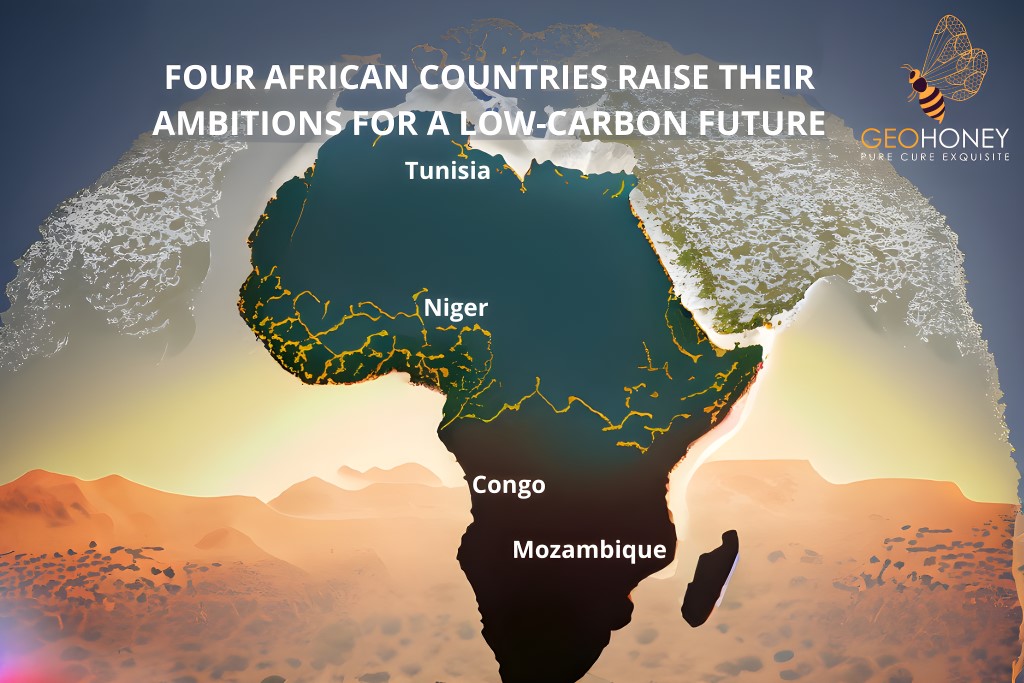- Tokyo: 22:04
- Singapore: 21:04
- Dubai: 17:04
- London: 13:04
- New York: 08:04
Four African Countries Raise their Ambitions for a Low-Carbon Future

The Democratic Republic of the Congo, Mozambique, Niger, and Tunisia are four African developing countries who have recently demonstrated their commitment to bold climate action. These four countries demonstrated substantial progress in combating climate change during the UN Climate Change's 28th round of technical analysis to examine the transparency of reporting by developing countries. They also emphasised the need for increased financial and technical assistance to help them reach the goals of the Paris Agreement.
The Democratic Republic of the Congo (DRC)
The Democratic Republic of the Congo combats climate change through reducing deforestation through REDD+ programmes and boosting renewable energy. In order to prevent slash-and-burn agriculture, which is the leading cause of deforestation, the DRC plans to build at least one million hectares of irrigated land by 2030. This will help to reduce deforestation, move to sedentary agriculture, and reduce greenhouse gas emissions.
Another planned climate change mitigation step is to boost renewable energy capacity from 2.9 megawatts (MW) in 2020 to 42.7 MW by 2030 by promoting the use of solar, wind, and hydroelectric energy. This effort also aims to improve the DRC's population's living standards by increasing access to power.
Mozambique
Mozambique is constantly fighting deforestation and intends to increase its usage of renewable energy.
Recognising the significance of sustainable agriculture, the country aggressively encourages conservation practices including rainwater collection and methane recovery in order to reduce greenhouse gas emissions. It also intends to use water pumping, which will be aided by the installation of 5,000 solar photovoltaic systems for agricultural irrigation and domestic water usage.
Additionally, the country intends to reduce emissions by giving solar and wind-powered electricity to 5,000 isolated families and replacing 2.5 million incandescent light bulbs with low-energy-consumption bulbs.
Niger
The rural population of Niger is heavily reliant on forest resources for energy production. As a result, the country is encouraging reforestation and the use of renewable energy sources. Niger has committed to boost the share of solar energy in its overall energy mix by 30% by 2030 as part of its National Renewable Energy Plan. This includes the construction of five new solar power plants, the expansion of renewable energy capacity, and the increase in electricity availability from 15.72 percent in 2020 to 65 percent in 2030.
The government is also fostering reforestation through a variety of efforts centred on afforestation, forest rehabilitation, and multi-purpose tree planting. The goal is to rehabilitate 15,000 hectares of woodland by 2030.
Tunisia
Tunisia's energy sector is seeing an increase in demand, prompting the country to make a deliberate move towards renewable energy in order to minimise reliance on fossil fuels and increase resilience. Tunisia funded around 587 million USD to renewable energy projects between 2010 and 2021, including investments in solar photovoltaic and wind power. A total capacity of 194 megawatts of grid-connected solar photovoltaic electricity saved 240 kilo-tonnes of oil equivalent and prevented 566 kilo-tonnes of carbon dioxide equivalent of greenhouse gas emissions.
Tunisia's "Low Carbon 2050" strategy, implemented in 2021, intends to reduce reliance on fossil fuels and carbon emissions in the energy sector by shifting 80 percent of energy production to renewable sources.
The examination of these four developing countries' greenhouse gas inventories and mitigation activities brought together a team of international technical experts who examined the consequences of these countries' climate actions, as well as the needed and received support.
They also identified capacity-building gaps to improve the transparency of these countries' reporting and assist them in transitioning to the Paris Agreement's Enhanced Transparency Framework. Needs include, among other things, better awareness of UN Climate Change reporting guidelines and revising the technique for conducting greenhouse gas inventories.
The UN Climate Change website will soon have summary reports for each participating country's technical analysis. If you want to participate in the technical analysis process, please see how to become a technical expert.
The Government of Kenya will host the 2023 Africa Climate Week in September, which will also allow regional policymakers, practitioners, and other stakeholders to showcase their achievements and lessons learned thus far, how they intend to improve their climate action and cooperation, and how they will ensure transparency of their climate pledges and initiatives.
Source: unfccc.int




Deforestation is the number one cause of floods that can even destroy the whole community or city, and it is negatively affecting the whole ecosystem.